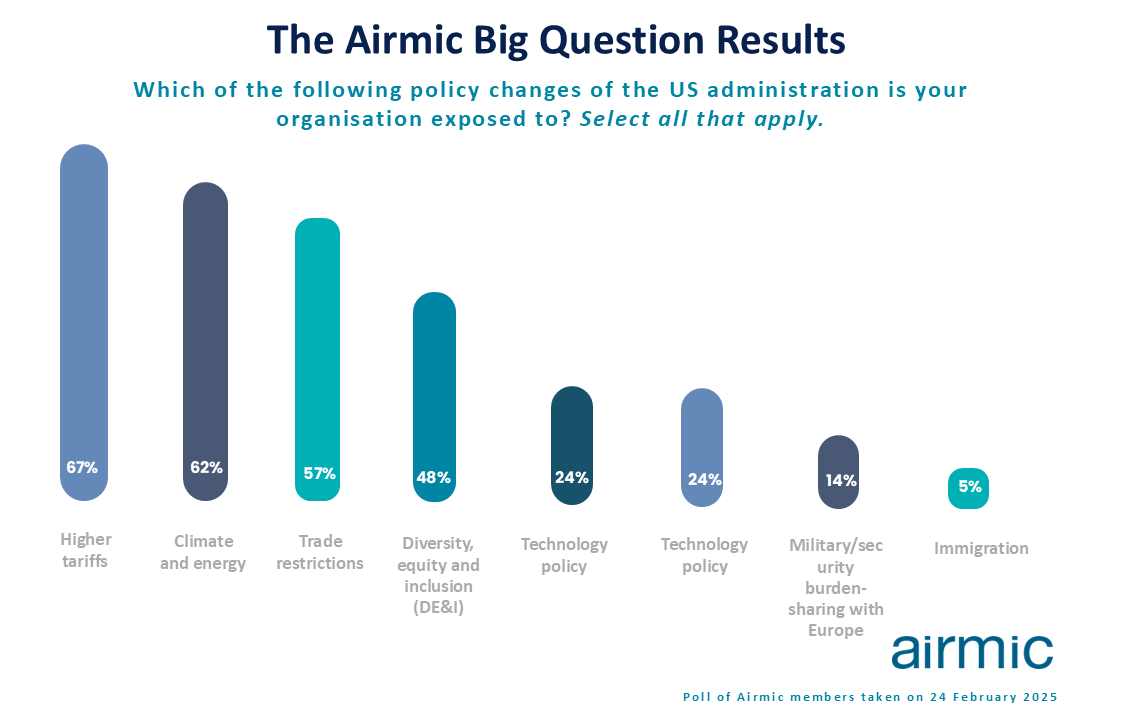US’S CLIMATE AND ENERGY POLICY CHANGES IS THE SECOND BIGGEST EXPOSURE FOR ORGANISATIONS: AIRMIC SURVEY
While news on the negotiations to end the Ukraine-Russia war has been dominating the headlines, it is the policy changes around climate and energy – out of the many policy changes of the new US administration – that present the second biggest exposure risk for organisations, the Airmic Big Question survey this week revealed. Higher tariffs was ranked the greatest exposure for organisations in the survey.

Julia Graham, CEO of Airmic, said: “In an increasingly complex and interconnected risk landscape, accompanied by the increasing velocity of change, risk professionals and their organisations need to be on top of events by relying on quality sources of intelligence, constantly monitoring changes in policy and other issues.”
On the day he took office on 20 January, President Donald Trump signed an executive order to start the process of withdrawing the US from the Paris Agreement, an international treaty under the United Nations Framework Convention on Climate Change (UNFCCC) that aims to reduce greenhouse gas emissions and adapt to climate change. During his first presidency, President Trump withdrew the US from the agreement, only for President Joe Biden to rejoin soon after taking office in 2021.
Hoe-Yeong Loke, Head of Research at Airmic, said: “Businesses seek consistency in the direction of travel of policymaking, especially when they are investing in long-term climate transition plans. They are trying to adapt to the many gear changes taken by the US on climate action in less than a decade, at a time they are urgently seeking clear global political leadership on tackling climate change. Crucial as climate action is, risk professionals and organisations need to appreciate how it is well and fully a political issue today. They must proceed with a multifaceted view of risk rather than focusing on just two or three key issues.”
The new US administration is also reversing diversity, equity and inclusion (DE&I) efforts in the US federal government, which it says are “wasteful” and “discriminatory”. Respondents in this week’s Airmic Big Question survey said the administration’s policy changes on DE&I was the fourth biggest exposure faced by their organisations.
Leigh-Anne Slade, Head of Media, Communications and Interest Groups, said: “Airmic members tend to be risk professionals at global businesses which would have a significant US presence, so all of the policy changes brought by the new US administration have the potential to impact them. Some of them have reported that their projects in the US have been cancelled or put on hold as a result of these policy changes. Good collaboration and communication within the risk profession are key to tackling many of these policy issues, and Airmic’s special interest groups have been an important platform for them – a Chatham House Rule-protected safespace to discuss policy challenges their organisations face.”
If you would like to request an interview and or have any further questions, please let me know.
We will be sharing the results of the Airmic Big Question with the press weekly.
You can also find the results here.
Media contact: Leigh Anne Slade
Head of Media, Communications and Interest Groups, Airmic
Leigh-Anne.Slade@Airmic.com
07956 41 78 77
